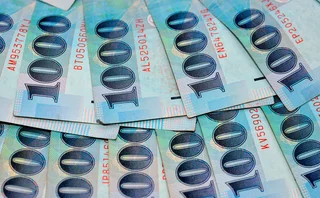
China hit by second trading scandal
The Chinese government could be facing hundreds of millions of dollars in losses after a state metals trader took a huge short position in copper futures. The short position, thought to be as much as 200,000 tonnes, has triggered speculation that the Chinese government is struggling to meet the December deadline for delivery, driving prices to record highs.
Three-month copper futures traded on the London Metals Exchange hit a record high of $4,220 a tonne on November 18, a rise of 39.5% since the beginning of the year. At these price levels, the Chinese government could be facing a loss of $100 million–200 million, say dealers.
The trader reportedly at the centre of the losses, Liu Qibing, worked for China's State Regulation Centre for Supplies Reserve (SRCSR), a business unit of the National Development and Reform Commission (NDRC). However, Liu was apparently trading on behalf of the State Reserves Bureau (SRB), also part of the NDRC. He has not been seen since rumours of the position started circulating on the London Metals Exchange in October.
Some traders say the December 21 delivery deadline on the short positions, which market participants estimate is anywhere between 100,000 and 200,000 tonnes, will be difficult to meet. In an effort to cool prices, the SRB declared on November 16 that it would sell 20,000 tonnes of copper, and said it had 1.3 million tonnes of copper in reserves, although some dealers challenge that figure. "Until two weeks ago, most people believed the SRB had 200–250 tonnes in stockpile. Suddenly, out of the blue, the SRB made a quasi-statement that it had 1.3 million tonnes," says Stephen Briggs, a metals economist at Société Générale in London. "The market didn't believe it and traded accordingly."
Dealers also suggest the SRB may have to roll over its positions. "There are very few facts at this stage. Some people are questioning whether that short position exists. Others are saying that it's being rolled forward and, if so, whether that exposure might be until December 2006 or 2007. There is lots of speculation," says Robin Bhar, a metals analyst at UBS in London.
The SRB did not return calls made by Risk, although SRB officials have denied any links with Liu in the Chinese media. "That is where the confusion has arisen," says Bhar. "He's never worked for the SRB. He worked for the SRCSR, which is a business unit of the NRDC. The SRB was technically correct in denying it because he didn't work for the SRB."
The fiasco will come as further embarrassment for the Chinese government following $550 million in losses by Singapore-listed China Aviation Oil that came to light in November last year.
Jill Wong
Only users who have a paid subscription or are part of a corporate subscription are able to print or copy content.
To access these options, along with all other subscription benefits, please contact info@risk.net or view our subscription options here: http://subscriptions.risk.net/subscribe
You are currently unable to print this content. Please contact info@risk.net to find out more.
You are currently unable to copy this content. Please contact info@risk.net to find out more.
Copyright Infopro Digital Limited. All rights reserved.
As outlined in our terms and conditions, https://www.infopro-digital.com/terms-and-conditions/subscriptions/ (point 2.4), printing is limited to a single copy.
If you would like to purchase additional rights please email info@risk.net
Copyright Infopro Digital Limited. All rights reserved.
You may share this content using our article tools. As outlined in our terms and conditions, https://www.infopro-digital.com/terms-and-conditions/subscriptions/ (clause 2.4), an Authorised User may only make one copy of the materials for their own personal use. You must also comply with the restrictions in clause 2.5.
If you would like to purchase additional rights please email info@risk.net
More on Foreign exchange
Will Taiwan lifers ramp up FX hedging amid tariff turmoil?
As TWD remains strong against the US dollar, Taiwanese life insurers are still poised to act
Deutsche Bank takes AutobahnFX on the open road
Proprietary trading platform sets out new workflow-based approach to collaborating with venues
Dealers bullish on Bloomberg chat interface for FX markets
Service expanded its API offering to integrate broker chats into banks’ engines for cash FX pricing late last year
LCH expects to boost deliverable FX clearing with new adds
Onboarding of dealers and link-up with CLS could swell interbank deliverable FX clearing volumes
Does no-hedge strategy stack up for mag seven mavericks?
At Amazon, Meta and Tesla, the lack of FX hedging might raise eyebrows, but isn’t necessarily a losing technique
Amazon, Meta and Tesla reject FX hedging
Risk.net study shows tech giants don’t hedge day-to-day exposures
Intraday FX swaps could signal new dawn for liquidity management
Seedling market could help banks pre-fund payments in near-real time and reduce HQLA requirements
Natixis turns on the taps in flow trading
French bank boosts flow business, balancing structured solutions capabilities







